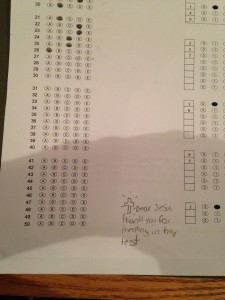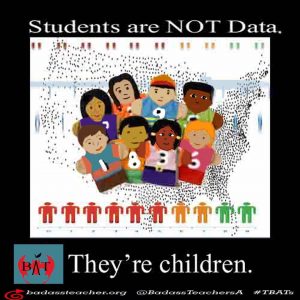My God! That’s like if you tried to make scrambled eggs and instead you caught syphilis! ~ Todd in the Shadows
A few days back, I paused to offer praise for the idea of using objective measurements to capture academic falls. I am not against “data.” But I do join many, many other teachers in finding data a threatening force in today’s academic environment.
I wish to start by observing that schools have always had data. What were all those grades and comments on report cards? We kept the report cards in cumulative folders — and still do — so that teachers could get snapshots of past performance. Our data might not have been exhaustive or perfect, but grade point average usually revealed a great deal, and a review of teacher comments and past state tests added to the picture.
That lack of perfection in the data may not have been a flaw, either. Children should not be boxed in by past academic efforts. If “Isidro” had a weak year in math before he entered my class, I want to find out what has been going wrong for him, but I am not going to assume that Isidro can’t now have a great year in my classroom. Today, I worry that the many tests we are making Isidro take throughout the year. combined with the past data we are saving, will influence teachers more heavily than those past report cards. If Isidro bombed six math benchmark tests, corporately-designed evaluative unit tests, and his state test, will teachers conclude that Isidro is mathematically challenged? Expectations can become self-fulfilling prophecies.
More importantly, even if Isidro’s teachers can manage to keep open minds, can Isidro? We tend to ignore the effect of data on children. Why? Do we think children don’t care? Do we think children are not drawing conclusions about their abilities? You don’t have to be a mathematical mastermind to grasp the idea that if your state test scores put you at the 22 percentile in your state, you surely blew the math portion of your test. Younger children often see the world in black and white. They still play cops and robbers (although probably not in all neighborhoods), and young kids see their cops as “good” and their robbers as “bad.” They also tend to classify themselves and others as “smart” and “dumb.” Educators try to control for this unfortunate desire to categorize people, but we don’t always win this fight.
“I’m just dumb,” multiple, middle-school students have now explained to me when I asked where tests and quizzes went wrong.
I leapt in to combat those ugly images, but I am not sure how much progress I made. Once a kid concludes he or she is dumb, they may also conclude that their protesting teacher is just being kind. Kids have trouble distinguishing lack of knowledge from lack of ability.
Test-related classroom placements can contribute to a demoralizing self-view. While subbing last year, I asked a bilingual student about his math skills.
“What do you think?” He answered. “I am in this class. Of course I am not good at math.”
I have more to explore here, but I am going to stop. Teacher views of data should be my next stop, but I don’t want to take away from this one question above, as we give test after test in our quest for data: Do we think children are not drawing conclusions about their abilities? Of course they are. And the further that test is positioned away from what our students know, the more badly that test goes, the more likely our students will say to yet another, future teacher, when explaining their struggles:
“I’m just dumb, Miss.”
Eduhonesty: Our children are not data. They are children.
We can make our children feel like data, though, and in the process we make many of them feel lost and stupid. Those sources of data, otherwise known as children? Sometimes our tests or “measuring instruments” make them cry. Some of them are skipping school to avoid tests. Some have absolutely given up. They are not even bothering to read the question on the test before they pick an answer. The research suggests more students are cheating, too.
Keeping it real out here.


